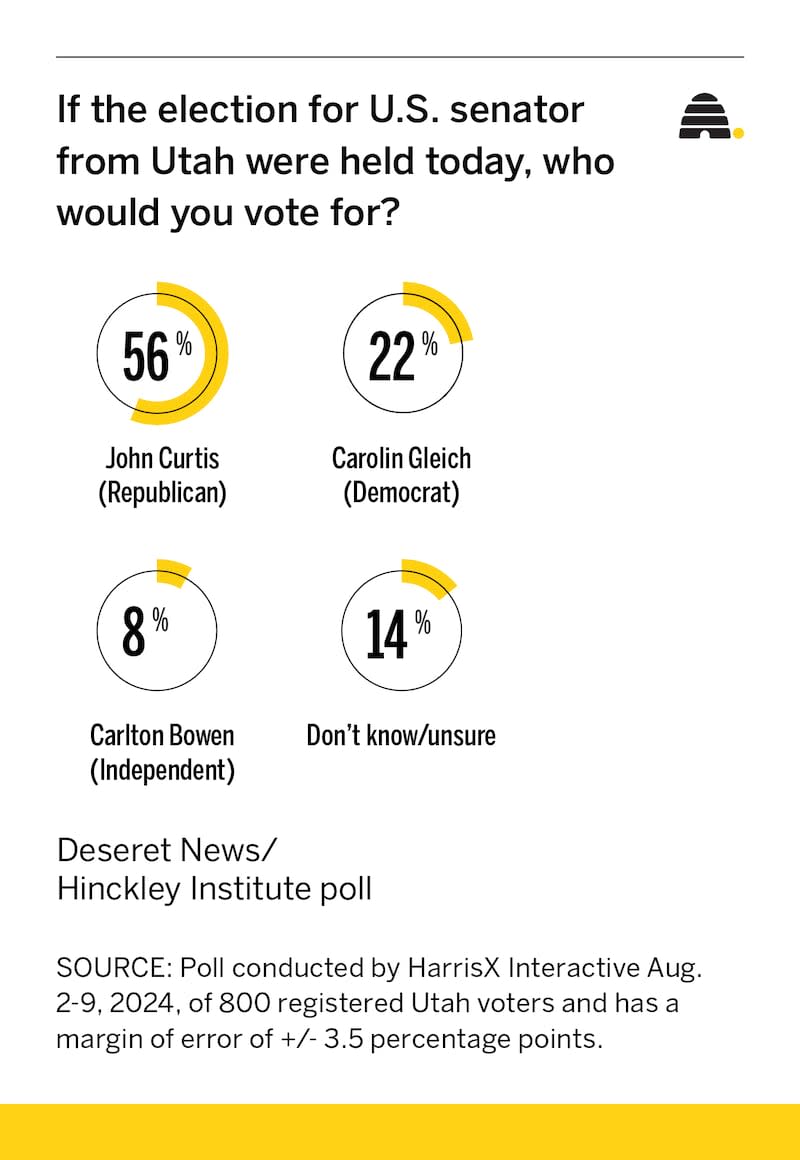Utah Rep. John Curtis holds a 34-percentage-point lead over his Democratic opponent, Caroline Gleich, in the race to replace Sen. Mitt Romney, according to a new Deseret News/Hinckley Institute of Politics poll conducted by HarrisX.
In a head-to-head contest, 56% of registered Utah voters said they would support Curtis, a Republican representing Utah’s 3rd Congressional District; 22% said they would vote for Gleich, the Democratic candidate; and another 22% said they don’t know who they will vote for, the poll found.
When these undecided voters were asked who they would vote for if the election were held today, Curtis’ lead over Gleich increased to 71%-29%. This 40-point advantage remained when voters were given the choice to vote for American Independent candidate Carlton Bowen.
“We are grateful to see the strong support of Utahns from all over the country,” said Curtis’ chief of staff, Corey Norman. “They know John and his record of fulfilling and protecting our Utah values. We look forward to working hard to share John’s message of how he will continue to deliver for Utah in the U.S. Senate.”
The poll was conducted from August 2-9 among 800 registered voters in Utah by HarrisX. The margin of error for the sample is +/- 3.5 percentage points.

The election is unique
The results tracked closely with the last few Senate elections in the Beehive State between Democrats and Republicans. In 2018, Romney defeated his opponent, Jenny Wilson, 63%-40%. In 2016, Senator Mike Lee defeated the Democratic candidate, Misty Snow, 68%-27%.
Lee’s re-election bid in 2022 featured a showdown with independent candidate Evan McMullin that saw the senator win by a narrow margin of 53%-43%. Utah Democrats did not advance a Senate candidate to the general election that year.
“An open U.S. Senate seat is a rare occurrence in Utah that results in a primary competition and an interesting race to watch in the general election,” said Jason Perry, director of the University of Utah’s Hinckley Institute of Politics. “John Curtis continues to be the clear frontrunner, backed by strong name recognition and a record of public service that resonates with voters. His approach to addressing Utah’s unique challenges also continues to increase his appeal with voters.
In a statement, Gleich said his candidacy has seen an increase in momentum because he is not represented in the polls. Gleich sees the race as a choice between ordinary Utahns who are concerned about “Utah families, our freedoms, and our future” and “career politicians.”
“Since entering the race in January, I’ve been excited about the support I’ve received from Utahns looking for a leader who will advocate for an economy that works for everyone, for clean air, and reproductive freedom,” Gleich said. “When John Curtis presents himself as a moderate, he votes in line with Donald Trump 94% of the time and has an 88% rating from the Heritage Foundation, the author of Project 2025.”
Curtis won the crowded primary race handily after campaigning on what he called “Utah values.” Up against Riverton Mayor Trent Staggs, former Utah House Speaker Brad Wilson and Moxie Pest Control CEO Jason Walton, Curtis came within 1.5% of snagging a majority of GOP primary voters.
During the campaign, Curtis sought to distinguish himself from the rest of the group by touting his congressional track record as one of the most productive and accessible members of Congress. He highlighted his accomplishments in changing the conversation on energy policy, transferring large amounts of federal land to Utah, taking a strong stance on Chinese aggression and rejecting budget recommendations from both Democratic and Republican administrations.
Curtis received criticism from fellow primary candidates for profitable stock trading while in office and for the amount of money outside the candidacy attracted to the race.
Gleich and Curtis on climate issues
During his seven years in Congress, Curtis has led the establishment of the Conservative Climate Caucus, led the Republican delegation to the United Nations climate conference, hosted several climate summits in the country and championed nuclear energy innovation.
Gleich, an athlete influencer and environmental activist, also promotes climate priorities, but from a typical liberal angle. Over the last decade, Gleich has lobbied congressional lawmakers on “clean energy bills,” including the massive Inflation Reduction Act, and would support “systemic” investments to overhaul the energy grid, public transportation and electric vehicle infrastructure. And unlike Curtis, Gleich supports increased access to abortion and a higher federal minimum wage.
In a three-way race that will appear on the Utah electoral ballot, Curtis has the support of 79% of Republican voters, 12% of Democrats and 40% of independents. Gleich currently receives the endorsement of 73% of Democrats, 6% of Republicans and 26% of independents. Bowen has less than 10% of each group. About 10% of Republicans and Democrats remain undecided, while nearly 20% of independents are not sure who they will support on November 5.
HarrisX CEO Dritan Nesho said “barring any unforeseen circumstances or surprises” Curtis – and Utah Governor Spencer Cox, who ran against Democratic state Rep. Brian King – “both are likely to win.” A New Deseret News poll showed Cox with a significant lead over his Democratic opponent.
“At this stage, there are just not enough undecideds sitting on the fence to prohibit Cox’s reelection for Governor or Curtis’ Senate win,” he said.




